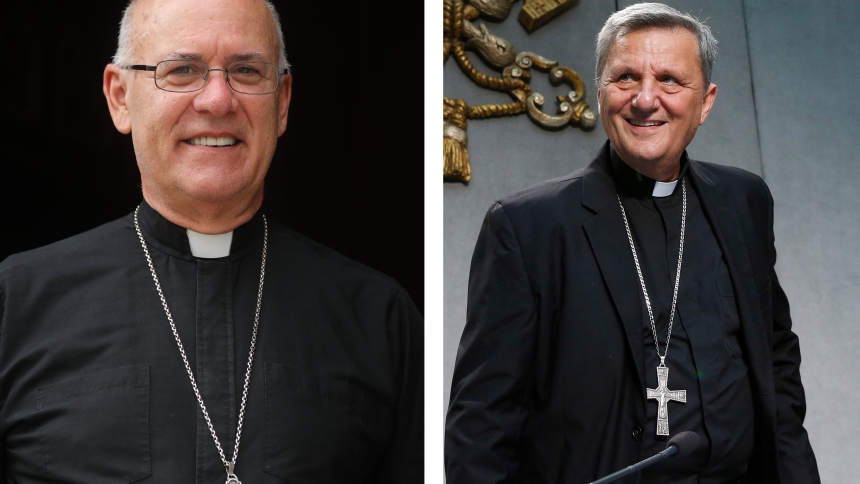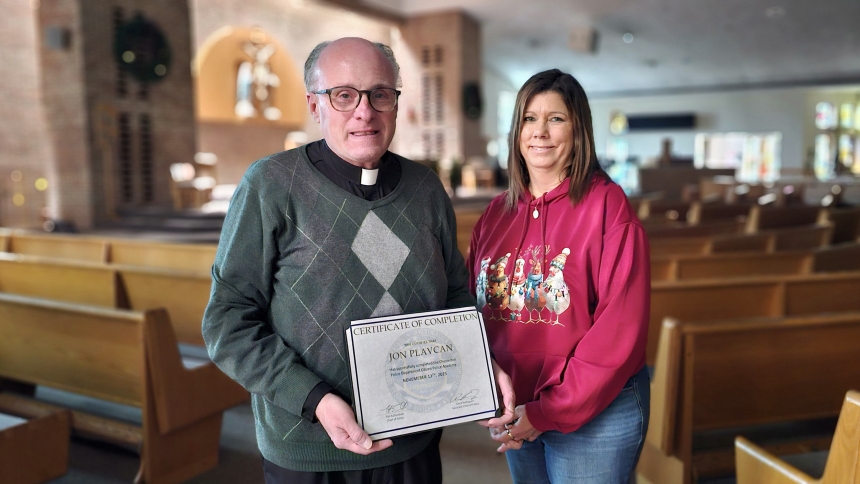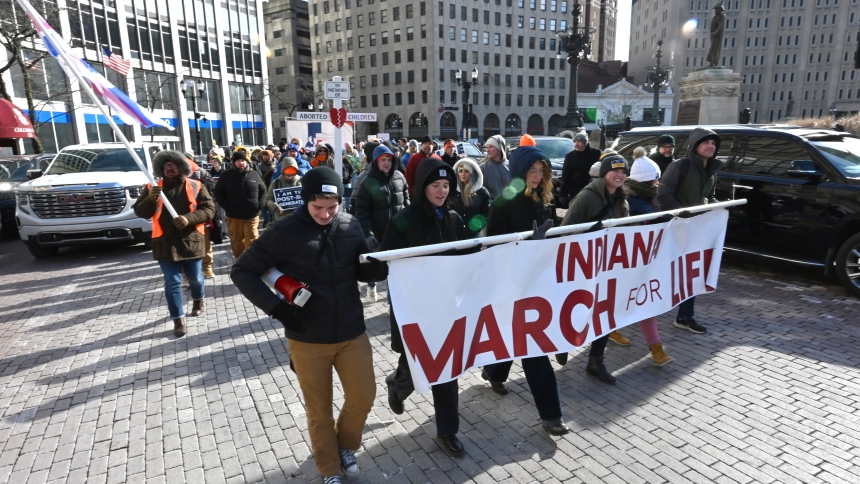
NOTRE DAME, Ind. (OSV News) - Synodality is an issue that everyone in the church needs to understand and embrace, Cardinal Mario Grech, secretary-general of the Synod of Bishops, told an audience at the University of Notre Dame.
The cardinal addressed "The Role of the Synodal Bishop" in a Feb. 26 talk at the Indiana university attended by bishops, university administrators, members of the faculty, undergraduate and graduate students, and laypeople.
Cardinal Grech, a native of Malta, came from Rome to join U.S. bishops gathered at Notre Dame in the last week of February. They were there to explore, discuss and pray about their own roles as bishops in the synodal church.
The cardinal, as theology professor John Cavadini noted in his introduction, was both appointed as the Synod of Bishops' secretary-general and named a cardinal by Pope Francis in 2020. Cavadini, director of the university's McGrath Institute for Church Life, noted the institute was co-sponsoring this special gathering of bishops with the U.S. Conference of Catholic Bishops' Committee on Doctrine.
"This has been a welcome development for many of us," Cavadini said about the Synod on Synodality called by Pope Francis. The first global session took place in Rome in October 2023; a second and final session is scheduled for Oct. 2-27.
A synod, he explained, is a gathering intended for the bishops of the church.
"Nonetheless," he pointed out, "it's also a suitable instrument to give voice to the entire people of God via the bishops who are established as the authentic guardians, interpreters and witnesses to the faith of the whole church."
Cardinal Grech began his address by saying that even in the few days he spent on campus with the bishops, some impressions about them were coming into sharp focus. "It's clear that the Catholic Church in the United States has a lot of gifts to share with the whole church," he said.
Cardinal Grech explained he would discuss the all-important role of the diocesan bishop in the synodal church from three different perspectives: first, through the Second Vatican Council's teaching emphasizing the Trinitarian nature of the church; second, in light of Vatican II's teaching that the laity -- like bishops and priests -- participate in the threefold offices of Jesus Christ as priest, prophet and king; third, as an invitation to bishops from Pope Francis to engage in ongoing formation as "synodal conversion" in the light of St. John Paul II's 1992 exhortation "Pastores Dabo Vobis" ("I Will Give You Shepherds").
Regarding the church's Trinitarian nature, Cardinal Grech said that the bishops participating in Vatican II (1962-65) had carefully studied and clearly saw that "the church comes from the Trinity and is meant to image the distinctiveness of each of the Divine Persons of the Trinity."
That's why, he continued, the last chapter of the Vatican II document "Lumen Gentium" ("The Light of Christ"), the Dogmatic Constitution on the Church, describes the church in Trinitarian terms. The church is called "the people of God" to represent the Father, "the Body of Christ" to represent the Son, and "the Temple of the Spirit" to represent the Holy Spirit.
Because of this Trinitarian nature, Cardinal Grech continued, a diocesan bishop's perception of his own ministry must match this theological reality of the church he serves.
Bishops are, he stated, "successors of Jesus' Apostles through the Holy Spirit. They are ordained to be mediators, facilitators and servants from within the whole church," who must understand and serve the church as it truly exists.
The second theological reality or truth that diocesan bishops must constantly keep in their hearts and minds, the cardinal continued, is that baptized laypeople also participate in the three offices of Christ as priest, prophet and king.
This point is repeated in a preparatory document for the 2023 session of the Synod on Synodality, he noted. The statement declared: "Every synodal process, in which the Bishops are called to discern what the Spirit is saying to the Church, not by themselves but by listening to the People of God, who 'shares also in Christ's prophetic office' (LG, no. 12), is an evident form of that 'journeying together' which makes the Church grow."
The third perspective that should be considered in examining the role of any synodal bishop, the cardinal said, is to look at the bishop's need for ongoing formation and conversion.
"In the synthesis report of last October's assembly," he said, "the word 'formation' appears 55 times. So, it was clearly a critical issue." But, he pointed out, "none of these instances of (the need for) formation refers to bishops. Isn't that strange?"
Clearly, modern documents of the church promote and illustrate the need for proper formation of every bishop, he said, quoting again from "Lumen Gentium," that the bishop "invested with the fullness of the sacrament of Orders is the steward of the grace of the Supreme priesthood."
"We must be able to relate to others," Cardinal Grech said. "This is especially important for a man who is called to be responsible for a community. This demands that the priest not be arrogant or quarrelsome, but be affable, sincere in his words and heart, proven to be discreet, generous and open to clear and brotherly relationships and capable of encouraging the same in others."
After Cardinal Grech concluded his talk, Bishop Kevin C. Rhoades, head of the host diocese, Fort Wayne-South Bend, thanked the prelate and all who had come to hear him and offered a brief response.
Bishop Rhoades said he was grateful to serve as U.S. synod delegate at the 2023 session. He said that he certainly appreciated and agreed with Cardinal Grech's highlighting of the crucial role of the Spirit in the synodal process.
"One of the best experiences I had there," Bishop Rhoades added, "was experiencing the atmosphere of prayer, the conversations in the Spirit.
"Our responsibility as synodal bishops," he said, "includes being servants of the faith of the church. We need to carefully discern the authentic manifestations of the "sensus fidei" (sense of faith), distinguishing them from popular opinions, particular interests, political ideologies and the spirit of the age. This is especially true in our culture today, and especially in the United States where there is so much polarization."
"We face a major challenge in the West today where so many of the baptized are being formed by currents of relativism and secularism," observed Bishop Rhoades. "We all need ongoing conversion - not just conversion to synodality, but, as Cardinal Grech noted at the end of his talk, conversion to the Gospel."
Caption: Bishop Kevin C. Rhoades of Fort Wayne-South Bend, Ind., and Cardinal Mario Grech, secretary-general of the synod, are pictured in a combination photo. Cardinal Grech gave a talk Feb. 26, 2024, titled "The Role of the Synodal Bishop" at the University of Notre Dame in South Bend, with Bishop Rhoades offering a response. (OSV News photo/Bob Roller/CNS photo/Paul Haring)


